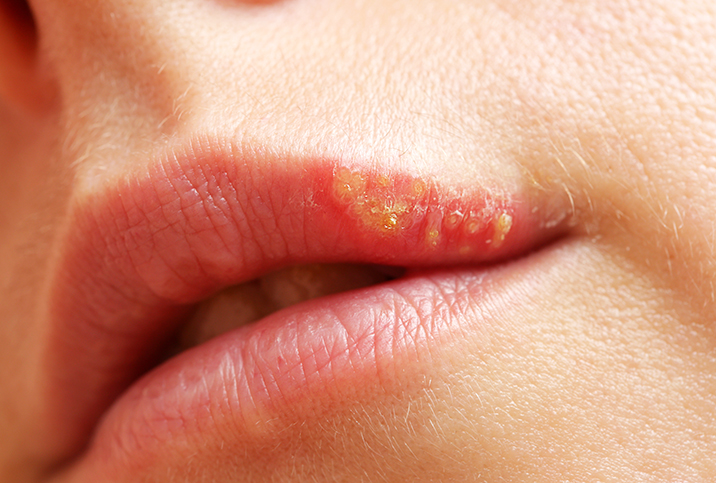A Dating Guide for Living With Genital Herpes

In the early stages of dating, we keep pieces of our history folded away until the right time to reveal them arises, but how do you do that when your body is in possession of a societal taboo?
Approximately 11.9 percent of people aged 14 to 49 years in the U.S. live with incurable genital herpes, otherwise known as an HSV-2 infection. And wrestling with this diagnosis while dating can be a trial by fire.
To clarify that not all STIs turn into long-term diseases, the terminology was switched from "sexually transmitted diseases'' to "sexually transmitted infections," but the social stigma of STIs remains strong. Around 50 percent of the population have HSV-1, usually contracted in childhood, but HSV-2 is less common and much more scorned. While misinformed critics might argue that those with genital herpes should avoid dating, it's time for that stereotype to be busted.
Communicating your diagnosis with a new potential partner
The first step when dating after being diagnosed with genital herpes is carefully communicating it with prospective partners. Keeping your status a secret will only harm the trust between you and them and put your partner at risk of contracting the condition. Openness will help prevent the diagnosis from overwhelming your life and deconstruct the pre-existing stigma surrounding genital herpes.
"We are becoming more and more open to the idea of sex, but for some reason, we cannot say the same about STIs," explained Liam Barnett, a UK-based relationship coach and founder of the online platform DatingZest. "One of the ways that would probably help destigmatize STIs would be to educate people on STIs…" and to explain that it's more common than we think.
Being upfront about your condition will be difficult, but it is not an excuse to avoid the conversation. Once you have discussed getting tested, bring up your positive status and calmly explain how the condition impacts your life (if at all), as well as how you manage it and control it safely.
Brace yourself for reactions fed by stigma. Not everyone is informed about how STIs are managed. If this happens, you have two choices: Explain the nuances of living with genital herpes and hope the person learns something or walk away. Either choice is valid, but remember to protect your own emotional and physical well-being first. Most importantly, do not judge yourself for having genital herpes.
Is it possible to date safely with herpes?
Simply put, yes, it is safe to date if you have genital herpes. However, to ensure that you are protecting your health and any potential partners' health, you need to be educated on the condition and how it manifests.
You may have few or zero symptoms sometimes, but herpes is noticeable when it does occur. According to Jeff Foster, a UK-based general practitioner with an interest in men's health, symptoms of genital herpes show up in a cycle that's dependent on the day of infection.
On day 0 after being infected/incubating:
- Itching and tingling in your genital area, or around the anus, will begin.
- Your genitals and/or anus may start to develop some redness.
- Vesicles, which are small, fluid-filled sacs, may appear on your skin. The fluid inside these sacs may be clear, white, yellow or mixed with blood.
By day 8 or 9:
- You may develop a pustule or wet-looking ulcer around your genitals or anus.
- Burning or stinging on urination may also begin. An ulcer can be so painful, it may even prevent someone from being able to pass urine and result in urinary retention
- In patients with vaginas, changes in discharge may occur.
- Painful lymph nodes in the groin can appear.
- Some patients also get systemic features such as headaches, joint aches and pains, sore muscles, tiredness, fatigue and general flu-like symptoms.
From day 10:
- The ulcers will start to heal and often form crusting. This is usually complete by day 14 of the cycle.
Although the condition may not always be symptomatic, it is crucial to remember that herpes is a forever condition.
"Sometimes, in mild cases it is self-limiting and resolves spontaneously. On other occasions you may need some antiviral medication, for example Acyclovir (Zovirax) or Valacyclovir (Valtrex)," explained Suhail Hussain, M.D., a UK-based general practitioner. "There is no cure for genital herpes once you have contracted it, the virus can lay dormant in your body for years and can also recur if you are run down or under the weather."
Minimizing the risk of transmission
When having sex after a herpes diagnosis, it's your responsibility to minimize the risk of transmission for your partners. Like other STIs, HSV-2 is transmitted through sexual contact—vaginal, anal and even oral sex. The other common herpes virus—HSV-1—tends to cause oral symptoms such as cold sores, but there can be cross-contamination. For example, if there is skin-to-skin contact between someone's mouth and another person's genitals.
Living with genital herpes makes having multiple sexual partners risky, especially if the condition isn't carefully monitored. Make sure you are regularly checking your genitals for flare-ups and avoid sexual contact when sores or blisters are present. It is also important to abstain from sharing sex toys with someone with known genital herpes.
"Genital herpes can only be contracted by physical contact," Hussain said. "In practice, this means through contact with infectious secretions—either oral, genital or anal surfaces—or physical contact from areas with active lesions. The individual transmitting the infection may be asymptomatic but still shedding the virus. This is how most genital herpes infections are spread."
There is no preventative vaccine or cure for HSV, but it is possible to reduce the risk of transmission by adhering to the following guidance:
Using condoms creates a physical barrier but does not completely prevent risk.
The use of antiviral drugs may reduce transmission to partners. They're thought to reduce symptomatic and asymptomatic viral shedding up to 90 percent in some cases.
If you have active lesions or visible HSV, do not have sex as this is the infectious period. People with symptomatic HSV-2 can experience four to five outbreaks per year, but this can vary. Some may experience more and others might rarely have outbreaks or be completely asymptomatic.
Finding peace with your diagnosis
Like anyone else traversing the rocky landscape of the dating world, people with genital herpes face challenges, but it is not the end of life as you know it. Though romance will take on a different, more cautious shape, open and honest communication will be your gateway to dating success. Sure, it'll be tough to spill the news to a prospective partner, but it doesn't mean your sex life will come to a screeching halt. You'll be surprised at how open and willing partners will react. Start with self-acceptance and remember that herpes doesn't define who you are as a person.

















